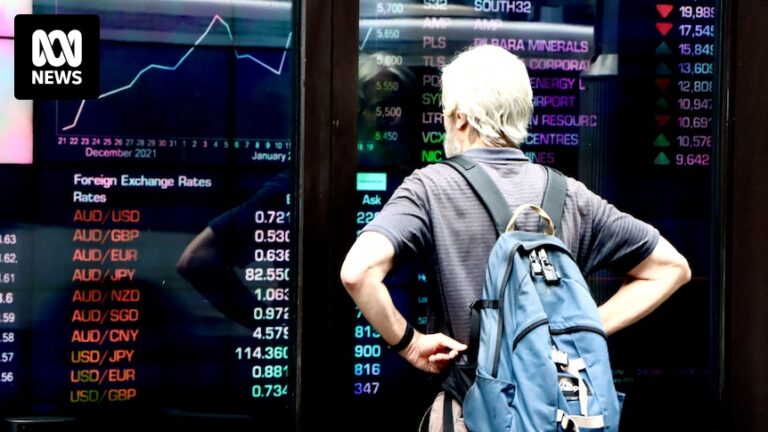Global financial markets have responded swiftly to much-worse-than-expected US economic data.
Total non-farm payroll employment rose by 73,000 in July, which was well below expectations of over 100,000 jobs.
However, combined with “shocking” revisions to employment data from May and June, there were 258,000 fewer jobs than previously expected.
The weak data followed another round of changes to reciprocal tariffs.
US President Donald Trump signed an executive order on Friday, Australian time, that adjusted so-called reciprocal tariffs on many countries, with new levies ranging from 10 per cent to 41 per cent.
Mr Trump told NBC News in a phone interview that he was open to more compelling offers, but it was “too late” for some nations to avoid duties as of next week.
Donald Trump initiated another round of tariffs on Friday. (Reuters: Kent Nishimura)
“It was a perfect storm,” Marcus Today senior portfolio manager Henry Jennings said.
“Weak revisions weighed more than the actual [July data].
“[The employment data for July] could have been explained away.”
Cracks emerge in US jobs market as Trump unveils new tariffs
Analysts said there was head-scratching among financial market participants around how the employment data for May and June could have been so inaccurate.
Mr Trump responded by sacking Bureau of Labor Statistics commissioner Erika McEntarfer.
“Trump blames the messenger, but uncertainty and tariffs are the real cause,” Mr Jennings said.
“[There has been] too much complacency [in financial markets] and reliance on technology [stocks] which is not the real world or economy.
“Chickens coming home to do their thing.”
Stock markets fall
Wall Street’s benchmark index, the S&P 500, closed down 101 points, or 1.6 per cent.
France’s CAC fell close to 3 per cent, while Germany’s DAX fell 639 points, or 2.7 per cent.
Investors sold equities or shares and bought US government bonds, sending their yields sharply down.
Bond yields move inversely to their prices.
The 10-Year US Treasury bond fell 0.15 per cent to 4.225 per cent.
Global markets have begun to fall. (AP: Seth Wenig)
“Bond markets had their biggest one-day drop in yields after a very soft jobs number and big downward revisions to prior months,” Jamieson Coote Bond’s James Wilson said.
“Bond markets are pricing in further economic slowdown and questioning whether the Federal Reserve will now need to cut more aggressively or put the US into recession.”
FNArena finance commentator, Danielle Ecuyer, said the news of tariffs and disappointing US economic data hit global stock markets that had been flirting with record highs.
“US markets went into Friday’s disappointing job report at record levels,” she said.
“When combined with higher than expected global tariffs, including on major trading partners like Canada, and a poor earnings outlook from tech giant Amazon, it was enough for profit taking and sellers to move in.
“August is a typically weak and volatile month for equity markets as the northern hemisphere goes on holiday.
“This year is unlikely to be different after the record V-shaped recovery from April lows.”
Wilson Asset Management owner Geoff Wilson told the ABC that global financial markets were now pricing in a serious downturn for the US economy.
Trump reveals new ‘reciprocal’ tariffs
“Markets are reacting to noise in the data as if a hidden recession has emerged, while the core indicators still align with a resilient economy.”
He said the latest US jobs report supports the case for an interest rate cut from the Federal Reserve at its next meeting.
But that would be a mistake, he argued, if the disappointing jobs data was not reflective of the health of the US economy.
“If the Federal Reserve cuts [interest rates] now, it risks undermining its credibility,” Mr Wilson said.
Mr Trump said on early Saturday morning, Australian time, that the Federal Reserve Board should “… assume control and do what everyone knows has to be done.”
He later wrote on social media, “Jerome ‘Too Late’ Powell, a stubborn moron, must substantially lower interest rates, now.”
RBA watching closely
Financial markets often appear to “shrug and move on” from Mr Trump’s tariff decisions, but the RBA says it was watching like “hawks”. (ABC News: Kylie Silvester)
Australia’s Reserve Bank has previously said it was watching US economic developments, and the interactions between Jerome Powell and Donald Trump, closely.
“I can’t speak to what goes through Mr Trump’s mind,” RBA governor Michele Bullock told journalists at the bank’s July press conference.
“I’m not sure anyone can.
“Obviously, I think as we all know, Jay Powell’s term is coming to an end.
“It’s going to be interesting to see what happens from here.
“But I would say that generally, the general principle around the world of central bank independence still remains a very firm guiding light,” she said.
Fears US economy headed towards recession
For Australians, overnight developments could be positive.
The news saw the Australian dollar climb over 1 per cent to near 65 US cents, which would be welcomed by travellers.
It has since edged back slightly.
As for mortgage borrowers, analysts say a US recession would force the Federal Reserve to slash borrowing costs.
Based on movement in Australian money markets overnight, there could be similar downward pressure on local interest rates.
Australia’s 3-Year Bond plummeted overnight, down 0.118 points to 3.331.
“[The RBA] may be thinking about cutting interest rates by 0.5 percentage points at its next meeting,” Mr Wilson told the ABC.
